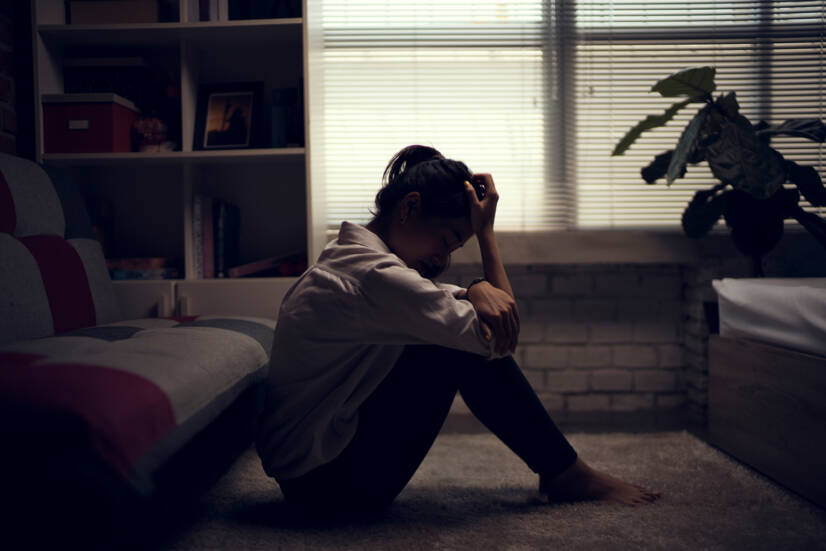Depression is a pathological change in mood. It is manifested by
a persistent feeling of sadness and
loss of interest. The illness, called
depressive disorder, affects feelings, thinking and behaviour. It leads to various emotional and physical problems.
A person with depression has difficulty carrying out normal daily activities. He or she has no interest in his or her surroundings and loved ones. He or she may feel that nothing in life gives him or her pleasure anymore and that life is not worth living.
Depression is not a momentary weakness. It cannot be slept off or 'changed'. Depression usually requires long-term treatment.
In psychiatry as a medical field, it is classified as an affective disorder.
It is one of the most common mental illnesses in general. It is also a symptom of many physical illnesses. Approximately 10-15% of the world's population will experience a depressive episode at least once in their lifetime.
The most serious consequence of untreated depression is the risk of committing suicide.
Its accompanying somatic (physical) manifestations are also unpleasant. These may include cardiovascular, gastroenterological or neurological diseases.
Most patients even today go unnoticed and unhelped. Depression is still stigmatised as a psychological disorder.
Approximately 60% of people with depression do not seek medical help. They fear a sense of failure, misunderstanding from family or ridicule at work.
What is going on in the brain?
Depression has a molecular origin. It is a dysregulation and interaction between the availability of neurotransmitters, their receptors and sensitivity.
The most well-known neurotransmitter associated with depression is serotonin and the disruption of its activity in the central nervous system.
Other neurotransmitters responsible for the development of affective disorders are:
- noradrenaline
- dopamine
- glutamate
- the neurotrophic factor BDNF
Depression can manifest as a symptom of certain physical illnesses or come on suddenly
People with a certain personality type are predisposed to depression. They may be physically quite healthy. But with more difficult times in life and emotional stress, they develop a depressed mood or even a depressive disorder.
They are people with these character traits:
- orderliness
- conscientiousness
- diligence
- focus on performance
- dependence on intimate personal relationships
- obsession
- restraint
- discretion
- dominance
In other people, depression is a symptom of a chronic illness.
Examples include:
- neurodegenerative diseases (Alzheimer's disease, Parkinson's disease, Huntington's disease)
- ischaemic stroke
- multiple sclerosis
- epilepsy
- migraine
- oncological diseases
- infectious diseases (encephalitis, endocarditis, hepatitis, mononucleosis, syphilis, tuberculosis)
- macular degeneration
- endocrinological diseases (hypothyroidism, goiter, hypoparathyroidism, Addison's disease, Cushing's syndrome, etc.)
- menopause
- chronic pain
Psychiatric disorders that cause symptoms of depression:
- Bipolar disorder- This is a psychiatric disorder. It is characterized by mood changes ranging from mania to depression. Sometimes it is difficult to distinguish bipolar disorder from depression.
- Cyclothymic disorder - Involves milder highs and lows than in bipolar disorder.
- Persistent depressive disorder - Also referred to as dysthymia. It is a less severe but chronic form of depression. It is usually not completely disabling. But a persistent depressed mood limits normal functioning in daily activities and a full life.
- Premenstrual Dysphoric Disorder - These are symptoms of depression associated with hormonal changes. They begin a week before menstruation and improve within a few days after it begins. They usually disappear after menstruation ends.
- Postpartum depression - This psychological disorder occurs in women after childbirth. It most often occurs a few days after childbirth. It can occur up to a year after the birth of the baby. It is a slightly more serious condition than the postpartum blues. The blues last for a few days after childbirth and can be managed without the help of doctors. Postpartum depression requires therapeutic intervention and often the use of antidepressants.
Depression is not just a feeling of sadness. It has multiple symptoms
Depression may occur only once in a lifetime, but in most people it occurs repeatedly.
During a depressive episode, symptoms occur throughout the day, almost every day. They include:
- a feeling of sadness (differing from normal, commonly felt sadness in that it is disproportionate in intensity without an obvious stimulus and long lasting)
- tearfulness
- emptiness or hopelessness
- outbursts of anger
- irritability or frustration over even small things
- loss of interest and pleasure in all activities such as sex, hobbies or sports
- sleep disturbances, including insomnia or sleeping too long
- fatigue and lack of energy
- decreased appetite and weight loss or increased appetite and weight gain
- anxiety, panic or restlessness
- slowed thinking, speaking or body movements
- feelings of worthlessness or guilt, fixation on past failures or self-blame
- difficulty thinking, concentrating, making decisions or remembering
- frequent or recurrent thoughts of death, suicidal thoughts, suicide attempts
- unexplained physical problems such as back or headaches
- psychotic symptoms called depressive delusions:
- Self-accusatory - The patient blames him/herself for misfortunes affecting innocent people, most often close family members. This may include strangers, such as victims of global disasters.
- Incapacitating - The patient sees themselves as completely incapable.
- Ruinous - The patient has an inescapable idea that they will end up "broke". They fear the loss of all their possessions and poverty.
- Nihilistic - In extreme cases of depression, the patient denies the existence of his/her own person or the presence of his/her internal organs. The existence of a family member may also be involved.
- Hypochondriac - The patient suffers from the delusion that he has an incurable, fatal, often unknown and rare disease.
Depression can also affect children
Symptoms of depression can vary at different ages.
In children and adolescents, they are similar to those of adults. There are a few differences.
In children, symptoms include irritability, relationality, fear, physically unexplained pain, weight loss, school neglect or truancy, in addition to sadness.
For adolescents, irritability, negative feelings, feelings of worthlessness, anger, poor school performance, poor grades, recreational drug or alcohol use, binge eating, daytime sleeping, self-harm, loss of interest in hobbies and avoiding contact with friends are common symptoms.
Depression affects many seniors but is not a normal part of aging
Depression in elderly family members is never taken lightly. Very often, it goes undiagnosed and untreated in seniors. Most of the time, they don't want to admit the problem to themselves to seek help.
Symptoms of depression in older adults may be less obvious. They include:
- impaired memory or personality changes
- physical pain
- unbearable fatigue
- loss of appetite
- trouble sleeping
- formerly active seniors now want to stay home, don't go out socially and don't do new things
- suicidal thoughts, especially in older men
Don't ignore depression! It requires attention and treatment
Treating depression has several important steps:
- Diagnosis of depression itself, i.e. identifying all the signs, symptoms and symptoms
- Professional psychiatric examination and interview with a therapist, setting up a schedule of regular check-ups and observations
- Determination of the cause of the depression, if there is a cause
- Appropriate medication treatment and monitoring of its effectiveness
- Efforts to gradually resolve all causes of depression, manage its symptoms and eventually the depressive state itself
Most antidepressants are indicated and prescribed by a psychiatrist, who then monitors their effectiveness. An adult GP may prescribe drugs from the tricyclic (TCA) and tetracyclic (TeCA) antidepressant groups and selective serotonin reuptake inhibitors (SSRIs).
Do not stop taking antidepressants even if you feel better
Antidepressants are not primarily addictive drugs, but sometimes so-called physical dependence can occur. This is different from addiction when taking drugs.
Suddenly stopping medication on your own or skipping a few doses can cause withdrawal symptoms and suddenly make depression worse.
Some antidepressants may be dangerous to the fetus during pregnancy or breastfeeding. If you become pregnant while on treatment, discuss further use with your doctor. Do not attempt to stop treatment on your own. Trust the advice of your psychiatrist.
Psychotherapy is an important part of treatment
There are several very effective types of psychotherapy. Examples are cognitive behavioural therapy or interpersonal therapy.
Psychotherapy can help you adjust to your current stage in life, cope with a crisis or other current difficulties. It identifies negative beliefs and behaviours. It teaches you to replace them with healthy and positive thoughts.
It is important to develop positive interactions with other people in your environment. You will learn to set realistic life goals and gradually achieve them.
Psychotherapy should last for a minimum of 6-8 weeks of regular sessions, ideally up to 4 months. It should last until the symptoms of depression improve.
For more information, see also the articles:











